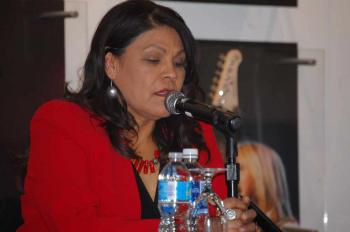Image Caption
By Shari Narine
Windspeaker Contributor
EDMONTON
When the Assembly of First Nations executive meets this Wednesday and Thursday in Ottawa, for the first time ever Alberta’s regional chief will be a woman.
“It feels amazing. Made history in Alberta,” said Marlene Poitras, who won the position on Feb. 22. The second ballot vote saw her defeat former Tsuut’ina Chief Roy Whitney by capturing 66 per cent of the support.
“I really appreciate the vote of confidence from the chiefs and I’m looking forward to working with them to achieve great things in Alberta,” she said.
Poitras is from the Mikisew Cree Nation. She notes it has been 15 years since someone from Treaty 8 filled the position. She was nominated by Treaty 8 Grand Chief Rupert Meneen and and Kehewin First Nation Chief Brenda Kehewin-Vanguard. But, she admits, it took more than Treaty 8 chiefs to put her over the top. Thirty-nine chiefs voted.
“The chiefs know me because I’ve always worked in the political arena. They know my work and my integrity,” she said.
Poitras’ past commitments have included serving on AFN committees as well as working as CEO for the Athabasca Tribal Council.
Poitras was one of three non-chief candidates to contest the seat. Also seeking the position were lawyer Will Willier and Gina Potts, who has served in policy positions for the AFN. Joining Whitney as a former chief was Ermineskin Chief Randy Ermineskin.
Poitras is firm that her priorities will be set by Alberta’s chiefs. To that end, she will be holding a strategic planning session to get direction from them and to set her mandate.
She knows that treaties will be high on that priority list. Treaties were the focus of all five candidates at the leadership forum held on Feb. 18 at the River Cree.
Whether it’s developing a legal framework as proposed by Prime Minister Justin Trudeau, doing away with the Indian Act or any other changes “the basis of that has to be treaty and our inherent rights and our sovereignty. Nothing less… we owe that to our people, we owe that to our ancestors and we owe that to those yet to come,” said Poitras.
Other issues that she anticipates making the short list will be the Canadian justice system, concerns of which have been underscored by the recent verdicts in the Colton Bushie and Tina Fontaine murder trials; the high rate of Indigenous children in care; and the high rate of Indigenous youth suicide.
“There are a lot of issues that our people face. I want to be like a conduit where I can alleviate some of those problems,” she said.
The Sixties Scoop is another issue that Poitras sees focusing on and it is personal to her. She had a little brother taken from her mother at the now-closed Charles Camsell Hospital, in Edmonton. She and her mother, now 82, still have not been able to find him.
Poitras says her recent appointment as chair of the Alberta government’s First Nations Women’s Council on Economic Security is a strong fit with her position as regional chief. She also says it gives her insight on understanding how the province wants to proceed on Indigenous issues as well as the chance to work with the Trudeau government as Ottawa interacts with the provinces on Indigenous issues.
“It’ll put me in a good spot to have those discussions internally at both levels,” she said.
Poitras will officially begin her three-year term in June. She takes over from Regional Chief Craig Mackinaw.

